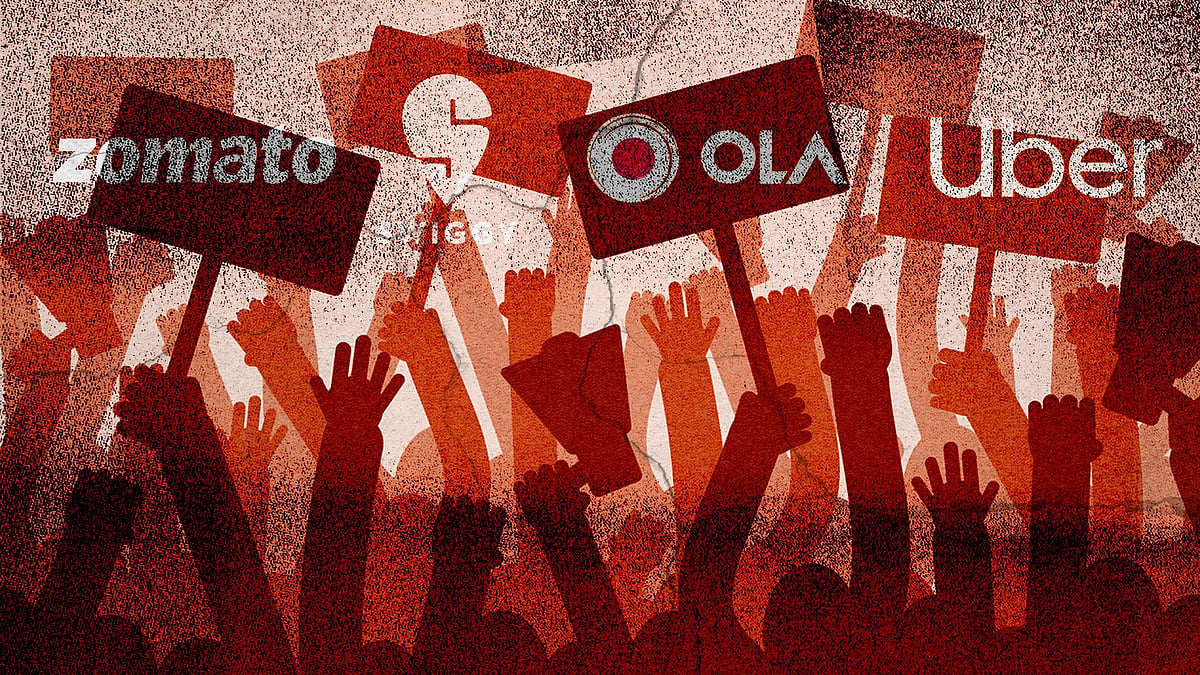‘We are slaves to them’: Zomato, Swiggy delivery workers speak up against unfair practices
They are battling job insecurity, variable pay, low base pay, increasing fuel prices, and inconsistency in incentive payments.
The irony of Zomato’s website for its delivery workers is hard to ignore.
“Ride with pride,” it says. As you scroll down, figures such as “1 lakh + happy partners” and “10 crore + happy deliveries” pop out.
This at a time when “delivery partners” across India are far from happy. Over the last two weeks, Zomato and Swiggy delivery workers have been taking to social media to speak up against the alleged exploitative practices of the two companies. The protest was a long time coming.
It began with two delivery workers tweeting anonymously as SwiggyDE and DeliveryBhoy about how the food delivery companies were exploiting them. They were soon joined by many other Swiggy and Zomato workers.
The delivery workers have constantly battled job insecurity, variable pay, a low base pay, lack of long-distance return bonuses, and alleged absence of the first mile pay. But increasing fuel prices, inconsistency in incentives, and decreasing money in hand – all in a pandemic year – have been a catalyst for some of them to break their silence.
“They call us partners but they don’t treat us that way. We are slaves to them,” said Jamshed, 43, a delivery man in Gujarat who works for both Zomato and Swiggy. “We aren’t employees for them but labour, so they expect us to not raise our voices or ask questions. But with no job security, how do we survive?”
Jamshed voiced the sentiment of many delivery workers who told Newslaundry about how they work for 12 to 14 hours a day for a minimum variable income.
According to Zomato, there is no set average base pay for the workers; it depends on the region and city of employment. The total remuneration includes variable components such as wait time and distance travelled.
A Zomato spokesperson claimed the average pay per order for delivery workers has increased by 20 percent over the past year. Zomato delivery workers told us they receive about Rs 20 for deliveries within four km, after which they get Rs 5 per km.
A Swiggy spokesperson said a delivery worker’s earnings comprise three main components – per order payout, which is proportional to factors like distance traveled and time taken, surge pay, and incentive pay. Swiggy also said their delivery workers earned over 20 percent more in July 2021 than they did in January 2020.
So, a full-time delivery man who works at least 12 hours a day might earn Rs 700-1,000 a day, but would have to spend Rs 400 on fuel, at least in a city like Mumbai.
According to a delivery man, Zomato also pays them an incentive of around Rs 200 if they earn at least Rs 575 a day, a part-time worker would get Rs 100 for a minimum earning of Rs 275.
Most delivery workers join Zomato and Swiggy under the impression that they can earn a significant amount of money. But they grapple with low base pay, several out-of-pocket expenses with little return, unhealthy work hours to meet targets and get incentives, and a cap on the money that can be earned in total. Delivery workers are also required to use their own bikes and pay on their own for things like fuel, repair and maintenance, phones and data plans, and company merchandise such as t-shirts, phone stands, and phone covers.
There’s also no guarantee of the number of deliveries they can do per day; while a delivery man in Mumbai told Newslaundry he delivers 20 orders on an average, a delivery man from Ahmedabad said he delivers as few as five per day, despite being logged in to the app all day.
This is not the first time Zomato and Swiggy delivery workers are protesting. After Swiggy slashed payments to delivery workers across four cities during the pandemic last year, the workers had agitated. Caravan had reported that these protests had resulted in Swiggy threatening to suspend the partners. A similar protest had taken place in 2019 by Zomato delivery workers after their incentives were slashed.
India also has no formal protection for gig workers. While the government has included gig workers in the draft labour law reforms under the Code on Social Security, they have not been included in the provisions dealing with wages, occupation safety, and industrial relations.
 Swiggy strike is a reminder that service aggregators care little for workers’ rights
Swiggy strike is a reminder that service aggregators care little for workers’ rights ‘Scary scenario’: Coronavirus is breaking the back of India’s restaurant industry
‘Scary scenario’: Coronavirus is breaking the back of India’s restaurant industry“You tell me, is an order for Rs 20 worth risking my life over?” asked Prakash, a Swiggy delivery man in Mumbai. He took up the job a year ago, after losing his post as duty manager in a mall due to the pandemic. With a base of Rs 20 per delivery, Prakash earns around Rs 32 on average for a delivery that requires him to travel six km.
“If we don’t do this for Rs 20, they will find someone who can do the same for Rs 15,” he pointed out.
A Swiggy spokesperson told Newslaundry that delivery workers are free to log in and log off as they wish. But the reality isn’t so simple.
Kaveri Medeppa Kaliyanda, a PhD scholar at the University of Sussex, is studying the work-life conditions of platform-based drivers and delivery workers. She said the claim that workers can log in and log off whenever they wish is a lie.
"Despite all the talk of 'freedom' and 'flexibility', workers must adhere to 'login shifts', mandatory peak-time logins, weekend work, and a very strict cap on order cancellations,” she said. “Workers cannot login and logoff as they wish, because incentives are attached to all these conditions being met.”
Delivery workers are also told not to raise their issues on social media. “They are focused on their money but don’t give priority to riders who are at the bottom level,” Prakash said. “If I speak alone, they’ll take action [against me]. But if we all speak together, maybe something can happen.”
Lack of uniformity
The delivery man behind DeliveryBhoy, an account that grew from 20 followers to more than 2,000 in a week, is careful to not reveal too much about himself. The consequences of the platforms finding out his identity, he said, would be brutal.
“The lack of uniformity in Swiggy and Zomato’s pays for their partners means that their responses on social media are not lies,” he said. “Each worker is paid, and exploited, differently. It’s almost comical how they cheat us so blatantly and we don’t have any evidence – and we never will.”
DeliverBhoy told Newslaundry that this “cheating” happens through variables like distance travelled and waiting time.
“They cheat you on the first mile. They tell you to go to the ‘red zone’ [designated spots close to multiple restaurants] so you spend on fuel for four to five km on your own,” he said. “For starters, workers should be paid for the first mile and given a base pay. I realised in my first week itself that there are several ways they are cheating people. It’s a very exploitative job.”
According to Kaveri, the lack of uniformity in rates also fragments workers. It strips a sense of commonality amongst workers when they see that their rates and incentives are not the same as their colleagues.
“They label them 'partners' and strip them of any form of labour rights or guaranteed income; they treat workers with no dignity,” she said. “They exercise utmost control and power in deciding incomes of workers because it is they who decide to cut rates and slash incentives or totally withdraw incentives as and when they wish.”
According to the workers, their IDs are blocked on the system when they ask too many questions, meaning they can no longer work for Zomato and Swiggy. Jamshed, for instance, has had two of his accounts blocked, he said, due to raising issues with his localities’ hub manager, who is the company’s point of contact for delivery workers. He had to create a new ID under a different name.
Jamshed added, “They treat us like footballs – kicked around from here to there, from the customer support team to the hub manager.”
Meanwhile, the person behind SwiggyDE_Mumbai has been working as a delivery man in the city for three years. He currently works 12 hours a day and earns Rs 35 on an average per delivery, making up to 20 deliveries per day. Out of this daily earning of Rs 600, at least Rs 300 is spent daily on fuel.
“The hard work we are putting in this is not worth it,” he said. “It’s tough to run the household with this income but we’re helpless.”
It is necessary, according to Kaveri, for the rates to be regulated, so that the incomes don’t fall beyond a certain point. Along with this, working hours must also be regulated and workers should be guaranteed a certain income irrespective of the demand from customers.
“There is an urgent need to distribute power to workers so that they are equal participants in decisions which affect their livelihoods directly,” she said. “Platforms control everything and enjoy unchecked power and that is the crux of the problem. It is especially concerning that the government uncritically accepts this labelling of workers as 'partners' and is participating in furthering informal and extremely precarious conditions of work and life.”
Names of some delivery workers have been changed to protect their identities.
